- Forum
- categories
- Sanitation systems
- Environmental issues
- The Year of Zero Waste: From Momentum to Action; Mar 27, 2024 01:30 PM India time
The Year of Zero Waste: From Momentum to Action; Mar 27, 2024 01:30 PM India time
4445 views
Re: The Year of Zero Waste: From Momentum to Action; Mar 27, 2024 01:30 PM India time
Hello!
I share with you some experiences of zero waste in Latin America.
One of them is the Zero Waste project funded by the Swedish International Development Agency. The purpose of this project is to improve the health of the population, reducing levels of environmental pollution and greenhouse gases (GHG). The objective is to generate integrated solid waste management models with an emphasis on recycling under a circular economy approach. To learn more about this project, please visit this link.
In general terms, this project has worked in the links of the operational management of services (collection, transport, utilization, final disposal) in nine municipalities in areas such as the valleys, highlands and plains of Bolivia. Waste separation at source and differentiated waste collection were proposed. In this way, organic waste is composted in composting centers and recyclable waste is managed in appropriate spaces for sorting, baling and storage of recyclables. You can learn more about this experience in this video (available only in Spanish)
Another very inspiring experience is the Peruvian initiative called “Sinba” whose concept revolves around the idea of a world without garbage, you can learn about this experience at this link .
This organization collects and manages:
1. Organic waste, which they transform into animal feed and compost;
2. Recyclable waste, which is properly segregated and baled for recycling companies;
3. Used oil that is distributed to industries that convert it into biodiesel.
4. Eco-bricks(1), which are generated with inorganic waste that cannot be recycled and are destined for social constructions of the organization Ecoladrillos Perú.
This experience is very interesting because it demonstrates the potential of converting garbage into raw material while generating sources of work and inputs for the productive industry.
Greetings!
(1) Note: An eco-brick is a plastic bottle filled with products that for technical or economic reasons are not recyclable, such as single-use plastics, Styrofoam, latex or even cigarette butts, in a compact form. Each eco-brick serves as a building block that can be used to produce structures. In this way it serves to capture and reduce the pollution that would otherwise be produced by the compacted materials inside.
¡Hola!
Les comparto algunas experiencias de basura cero en Latinoamérica.
Una de ellas es el proyecto Basura Cero financiado por la Agencia sueca de desarrollo internacional. La finalidad de este proyecto es mejorar la salud de la población, reduciendo niveles de contaminación ambiental y gases de efecto invernadero (GEI). El objetivo es generar modelos de gestión integral de residuos sólidos haciendo énfasis en el aprovechamiento bajo un enfoque de economía circular. Para conocer más sobre este proyecto, pueden ingresar a este link
En líneas generales,este proyecto ha trabajado en los eslabones de la gestión operativa de los servicios (recolección, transporte, aprovechamiento, disposición final) en nueve municipalidades de zonas como los valles, altiplano y llanos de Bolivia. Se propuso la separación de residuos en origen y la recolección de residuos diferenciada. De esa forma, los residuos orgánicos se compostan en centros de compostaje y los reciclables se gestionan en espacios adecuados para la selección, enfardado y almacenamiento de reciclables.
Pueden conocer más sobre esta experiencia en este video.
Otra experiencia muy inspiradora es la iniciativa peruana llamada “Sinba” cuyo concepto gira en torno a la idea de un mundo sin basura, pueden conocer esta experiencia en este link
Esta organización acopia y gestiona:
1. residuos orgánicos, que transforman en alimento para animales y abono;
2. residuos reciclables que segrega adecuadamente y enfarda para empresas recicladoras;
3. Aceite usado que se distribuye a industrias que lo convierten en biodiesel.
4. Ecoladrillos,que se generan con los residuos inorgánicos que no se pueden reciclar y son destinados a construcciones sociales de la organización Ecoladrillos Perú.
Esta experiencia es muy interesante porque demuestra el potencial de convertir la basura en materia prima al mismo tiempo que genera fuentes de trabajo e insumos para la industria productiva.
¡Saludos!
(1) Nota: Un ecoladrillo es una botella de plástico rellena de productos que por razones técnicas o económicas no son reciclables, como plásticos de un solo uso, espuma de poliestireno, látex o incluso colillas de cigarrillos, en forma compacta. El ecoladrillo sirve como bloque de construcción que puede utilizarse para producir estructuras. De este modo, sirve para capturar y reducir la contaminación que de otro modo producirían los materiales compactados en su interior.
I share with you some experiences of zero waste in Latin America.
One of them is the Zero Waste project funded by the Swedish International Development Agency. The purpose of this project is to improve the health of the population, reducing levels of environmental pollution and greenhouse gases (GHG). The objective is to generate integrated solid waste management models with an emphasis on recycling under a circular economy approach. To learn more about this project, please visit this link.
In general terms, this project has worked in the links of the operational management of services (collection, transport, utilization, final disposal) in nine municipalities in areas such as the valleys, highlands and plains of Bolivia. Waste separation at source and differentiated waste collection were proposed. In this way, organic waste is composted in composting centers and recyclable waste is managed in appropriate spaces for sorting, baling and storage of recyclables. You can learn more about this experience in this video (available only in Spanish)
Another very inspiring experience is the Peruvian initiative called “Sinba” whose concept revolves around the idea of a world without garbage, you can learn about this experience at this link .
This organization collects and manages:
1. Organic waste, which they transform into animal feed and compost;
2. Recyclable waste, which is properly segregated and baled for recycling companies;
3. Used oil that is distributed to industries that convert it into biodiesel.
4. Eco-bricks(1), which are generated with inorganic waste that cannot be recycled and are destined for social constructions of the organization Ecoladrillos Perú.
This experience is very interesting because it demonstrates the potential of converting garbage into raw material while generating sources of work and inputs for the productive industry.
Greetings!
(1) Note: An eco-brick is a plastic bottle filled with products that for technical or economic reasons are not recyclable, such as single-use plastics, Styrofoam, latex or even cigarette butts, in a compact form. Each eco-brick serves as a building block that can be used to produce structures. In this way it serves to capture and reduce the pollution that would otherwise be produced by the compacted materials inside.
¡Hola!
Les comparto algunas experiencias de basura cero en Latinoamérica.
Una de ellas es el proyecto Basura Cero financiado por la Agencia sueca de desarrollo internacional. La finalidad de este proyecto es mejorar la salud de la población, reduciendo niveles de contaminación ambiental y gases de efecto invernadero (GEI). El objetivo es generar modelos de gestión integral de residuos sólidos haciendo énfasis en el aprovechamiento bajo un enfoque de economía circular. Para conocer más sobre este proyecto, pueden ingresar a este link
En líneas generales,este proyecto ha trabajado en los eslabones de la gestión operativa de los servicios (recolección, transporte, aprovechamiento, disposición final) en nueve municipalidades de zonas como los valles, altiplano y llanos de Bolivia. Se propuso la separación de residuos en origen y la recolección de residuos diferenciada. De esa forma, los residuos orgánicos se compostan en centros de compostaje y los reciclables se gestionan en espacios adecuados para la selección, enfardado y almacenamiento de reciclables.
Pueden conocer más sobre esta experiencia en este video.
Otra experiencia muy inspiradora es la iniciativa peruana llamada “Sinba” cuyo concepto gira en torno a la idea de un mundo sin basura, pueden conocer esta experiencia en este link
Esta organización acopia y gestiona:
1. residuos orgánicos, que transforman en alimento para animales y abono;
2. residuos reciclables que segrega adecuadamente y enfarda para empresas recicladoras;
3. Aceite usado que se distribuye a industrias que lo convierten en biodiesel.
4. Ecoladrillos,que se generan con los residuos inorgánicos que no se pueden reciclar y son destinados a construcciones sociales de la organización Ecoladrillos Perú.
Esta experiencia es muy interesante porque demuestra el potencial de convertir la basura en materia prima al mismo tiempo que genera fuentes de trabajo e insumos para la industria productiva.
¡Saludos!
(1) Nota: Un ecoladrillo es una botella de plástico rellena de productos que por razones técnicas o económicas no son reciclables, como plásticos de un solo uso, espuma de poliestireno, látex o incluso colillas de cigarrillos, en forma compacta. El ecoladrillo sirve como bloque de construcción que puede utilizarse para producir estructuras. De este modo, sirve para capturar y reducir la contaminación que de otro modo producirían los materiales compactados en su interior.
Please Log in to join the conversation.
You need to login to reply- paresh
-

- Moderator
- Budding WASH researcher, especially interested in governance, public policy, finance, politics and social justice. Architect, Urban & Regional planner by training, Ex. C-WAS, India.I am a patient person :)
Less- Posts: 383
- Karma: 7
- Likes received: 143
Re: The Year of Zero Waste: From Momentum to Action; Mar 27, 2024 01:30 PM India time
Sharing this related event happening tomorrow
As the second annual United Nations International Day of Zero Waste approaches, GAIA is holding a live virtual event, “The Year of Zero Waste: From Momentum to Action,” on March 27. Join thought leaders–including policymakers, grassroots community leaders, climate and waste finance experts, and zero waste implementers– in a lively conversation on what it will take to escalate progress on zero waste worldwide based on current trends, obstacles, and proven strategies. Our panelists will dive into the cross-cutting themes that enable the transition into zero waste, including climate and waste management finance, social inclusion, waste prevention through plastic reduction, organic waste management, and more, as well as the myriad social and economic co-benefits municipalities have seen through the implementation of zero waste systems.
When: March 27, 9AM-10AM CET/ 1:30-2:30PM IST
Register here: bit.ly/ZWDay-AP-Africa-Eu
As the second annual United Nations International Day of Zero Waste approaches, GAIA is holding a live virtual event, “The Year of Zero Waste: From Momentum to Action,” on March 27. Join thought leaders–including policymakers, grassroots community leaders, climate and waste finance experts, and zero waste implementers– in a lively conversation on what it will take to escalate progress on zero waste worldwide based on current trends, obstacles, and proven strategies. Our panelists will dive into the cross-cutting themes that enable the transition into zero waste, including climate and waste management finance, social inclusion, waste prevention through plastic reduction, organic waste management, and more, as well as the myriad social and economic co-benefits municipalities have seen through the implementation of zero waste systems.
When: March 27, 9AM-10AM CET/ 1:30-2:30PM IST
Register here: bit.ly/ZWDay-AP-Africa-Eu
Paresh Chhajed-Picha
Moderator, SuSanA forum
Project Manager at ADCPS
Indian Institute of Technology - Bombay, India
Moderator, SuSanA forum
Project Manager at ADCPS
Indian Institute of Technology - Bombay, India
Attachments:
-
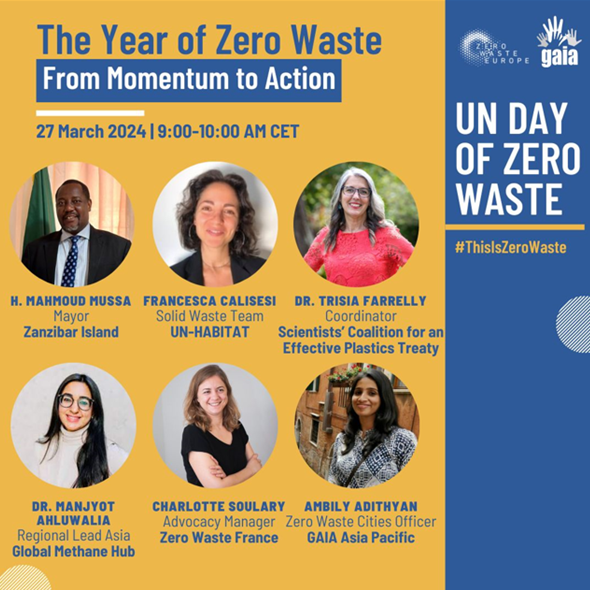 GAIAevent.png
(Filesize: 537KB)
GAIAevent.png
(Filesize: 537KB)
Please Log in to join the conversation.
You need to login to reply- Chaiwe
-

- Moderator
- Innovation enthusiast and Knowledge Management Expert in WASH and Climate Change while cross-cutting Youth and Gender Issues. CEO of CaDev_Capacity Development (An African Social Enterprise)
Less- Posts: 336
- Karma: 8
- Likes received: 116
Hello All,
As we approach the commemoration of International Day on Zero Waste 2024, scheduled for March 30th, I would like to share my personal experience regarding the persistent issue of solid waste in sanitation, particularly in many Sub-Saharan African countries. In Lusaka, for instance, faecal sludge emptied from informal pit latrines is typically laden with solid waste, posing significant challenges for management.
There have been discussions about standardizing toilet designs to prevent the deposition of solid waste in pit latrines, as well as exploring technologies that facilitate complete emptying or selective retention of solid waste in the latrines during latrine emptying processes. However, these solutions also present their own set of challenges. For instance, while taking away solid waste from the pit when emptying may satisfy household clients, they often result in logistical challenges when the faecal sludge, contaminated with solid waste, is transported to treatment facilities. Many existing faecal sludge treatment systems are ill-equipped to handle solid waste, necessitating solid waste screening and disposal in landfills despite its hazardous nature. See Image:
Screened solid waste from faecal sludge at FSTP in Lusaka Zambia processed for block making photo by CaDev
Recognizing the urgency of closing this waste management loop, I initiated a solution through an innovation-driven organization I founded, CaDev_Capacity Development in Zambia. Our aim is to put an end to the disposal of solid waste contaminated faecal sludge ending up in landfills by utilizing pyrolysis technology to convert this waste into a valuable resource known as "poop blocks." These blocks are non-toxic, environmentally sustainable, and contribute to carbon sequestration, offering benefits for waste management, climate mitigation and environmental conservation efforts.
Our FS poop blocks ready for a building project
I am eager to learn about similar solid waste management solutions aimed at addressing the sanitation sector's challenges ahead of the March 30th commemoration.
As we approach the commemoration of International Day on Zero Waste 2024, scheduled for March 30th, I would like to share my personal experience regarding the persistent issue of solid waste in sanitation, particularly in many Sub-Saharan African countries. In Lusaka, for instance, faecal sludge emptied from informal pit latrines is typically laden with solid waste, posing significant challenges for management.
There have been discussions about standardizing toilet designs to prevent the deposition of solid waste in pit latrines, as well as exploring technologies that facilitate complete emptying or selective retention of solid waste in the latrines during latrine emptying processes. However, these solutions also present their own set of challenges. For instance, while taking away solid waste from the pit when emptying may satisfy household clients, they often result in logistical challenges when the faecal sludge, contaminated with solid waste, is transported to treatment facilities. Many existing faecal sludge treatment systems are ill-equipped to handle solid waste, necessitating solid waste screening and disposal in landfills despite its hazardous nature. See Image:
Screened solid waste from faecal sludge at FSTP in Lusaka Zambia processed for block making photo by CaDev
Recognizing the urgency of closing this waste management loop, I initiated a solution through an innovation-driven organization I founded, CaDev_Capacity Development in Zambia. Our aim is to put an end to the disposal of solid waste contaminated faecal sludge ending up in landfills by utilizing pyrolysis technology to convert this waste into a valuable resource known as "poop blocks." These blocks are non-toxic, environmentally sustainable, and contribute to carbon sequestration, offering benefits for waste management, climate mitigation and environmental conservation efforts.
Our FS poop blocks ready for a building project
I am eager to learn about similar solid waste management solutions aimed at addressing the sanitation sector's challenges ahead of the March 30th commemoration.
SuSanA Forum Moderator
Skat Foundation (With financial support by GIZ and SIRWASH up to November 2023)
Chaiwe Mushauko-Sanderse BSc. NRM, MPH
Independent consultant located in Lusaka, Zambia
Emails: This email address is being protected from spambots. You need JavaScript enabled to view it., This email address is being protected from spambots. You need JavaScript enabled to view it.
LinkedIn: www.linkedin.com/in/chaiwe-mushauko-sanderse-21709129/
Twitter: @ChaiweSanderse
Skat Foundation (With financial support by GIZ and SIRWASH up to November 2023)
Chaiwe Mushauko-Sanderse BSc. NRM, MPH
Independent consultant located in Lusaka, Zambia
Emails: This email address is being protected from spambots. You need JavaScript enabled to view it., This email address is being protected from spambots. You need JavaScript enabled to view it.
LinkedIn: www.linkedin.com/in/chaiwe-mushauko-sanderse-21709129/
Twitter: @ChaiweSanderse
Attachments:
-
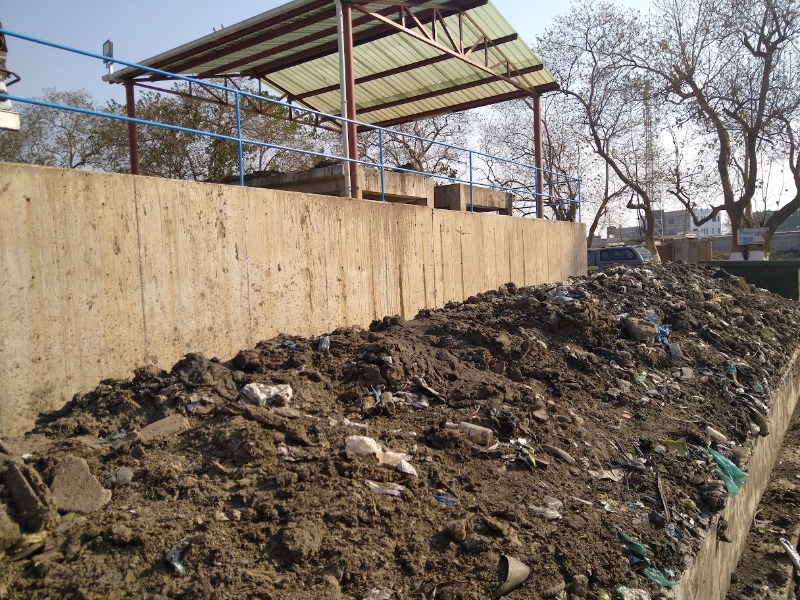 IMG_202308...4526.jpg
(Filesize: 254KB)
IMG_202308...4526.jpg
(Filesize: 254KB)
-
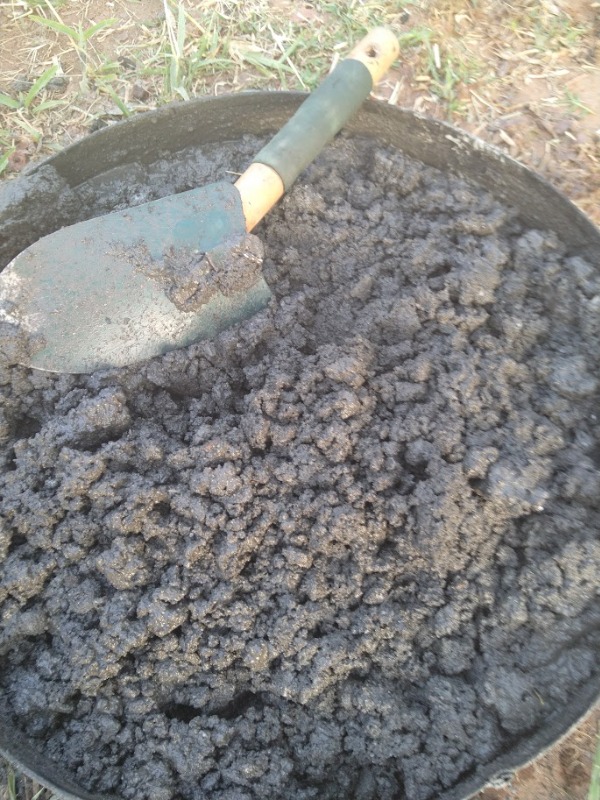 IMG_202309...2254.jpg
(Filesize: 191KB)
IMG_202309...2254.jpg
(Filesize: 191KB)
-
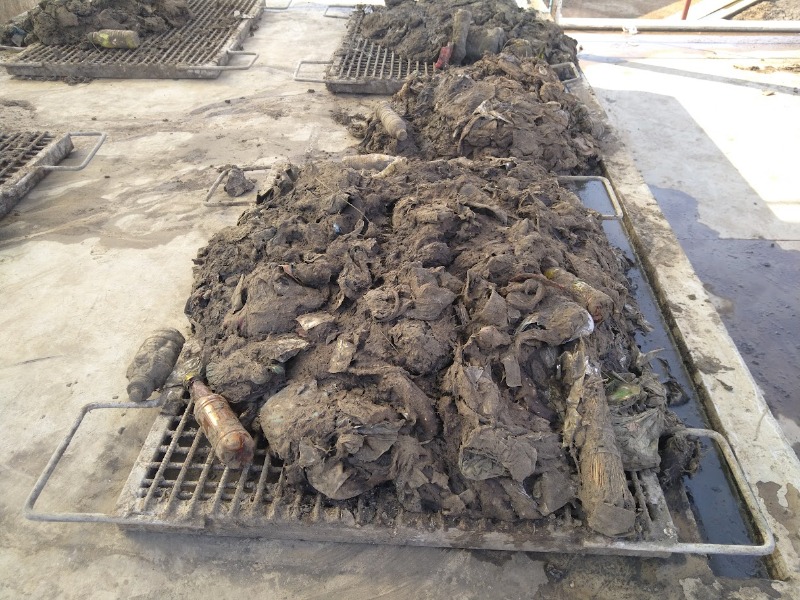 IMG_202308...4928.jpg
(Filesize: 199KB)
IMG_202308...4928.jpg
(Filesize: 199KB)
-
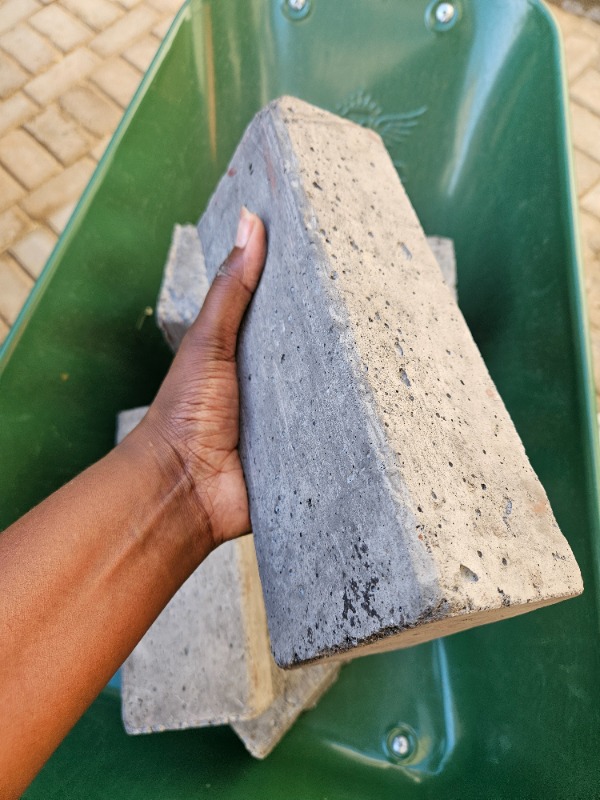 20240210_070818.jpg
(Filesize: 192KB)
20240210_070818.jpg
(Filesize: 192KB)
-
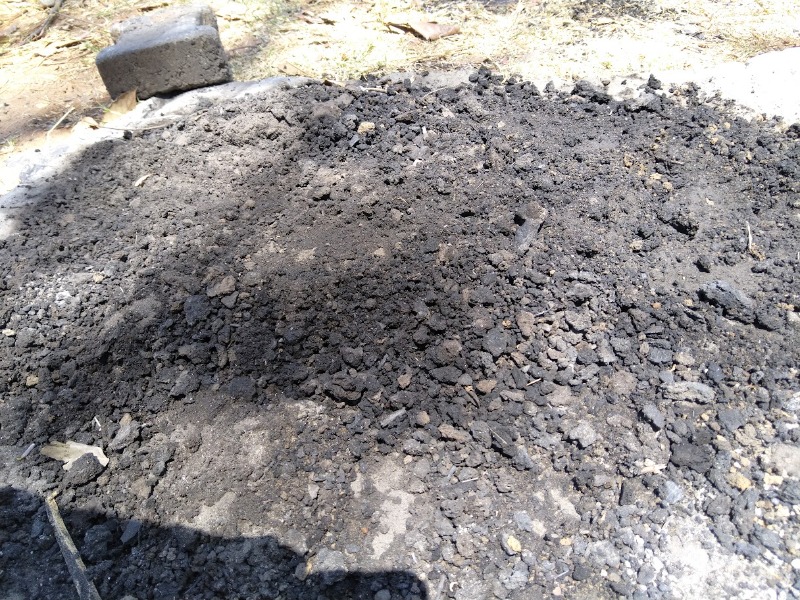 IMG_202309...2005.jpg
(Filesize: 267KB)
IMG_202309...2005.jpg
(Filesize: 267KB)
The following user(s) like this post: paresh
Please Log in to join the conversation.
You need to login to reply- Nyembezi
-
 Topic Author
Topic Author- Budding WASH Expert.
Less- Posts: 17
- Likes received: 6
Dear All,
Today is "International Day of Zero Waste" which falls on 30th March every year, the day is meant to raise awareness on the importance of zero waste and responsible consumption, production practices and urban waste management contributing to achieving sustainable development.
Yesterday a group of Environmental Health students from Levy Mwanawasa Medical University in Lusaka, Zambia went for a field learning visit to stir up innovation in protecting water source points against indiscriminate disposal of solid waste. During the visit, there was community engagement with Mhatma School Management to come up with sustainable solutions to poor solid waste management being practiced by the community surrounding Mhatma School and Public Library in Mtendere Compound a peri- urban area in Lusaka district.
The students have plans to engage with tthe community using the Urban School and Community Led Total Sanitation Hygiene Education Methodology in Mtendere in partnership with key stakeholders to be identified.
Best,
Rosemary.
Today is "International Day of Zero Waste" which falls on 30th March every year, the day is meant to raise awareness on the importance of zero waste and responsible consumption, production practices and urban waste management contributing to achieving sustainable development.
Yesterday a group of Environmental Health students from Levy Mwanawasa Medical University in Lusaka, Zambia went for a field learning visit to stir up innovation in protecting water source points against indiscriminate disposal of solid waste. During the visit, there was community engagement with Mhatma School Management to come up with sustainable solutions to poor solid waste management being practiced by the community surrounding Mhatma School and Public Library in Mtendere Compound a peri- urban area in Lusaka district.
The students have plans to engage with tthe community using the Urban School and Community Led Total Sanitation Hygiene Education Methodology in Mtendere in partnership with key stakeholders to be identified.
Best,
Rosemary.
Office Administrator at the Skills Advisory Group for Water Supply and Sanitation(SAG-WSS)
Project Associate at CaDev
Project Associate at CaDev
Attachments:
-
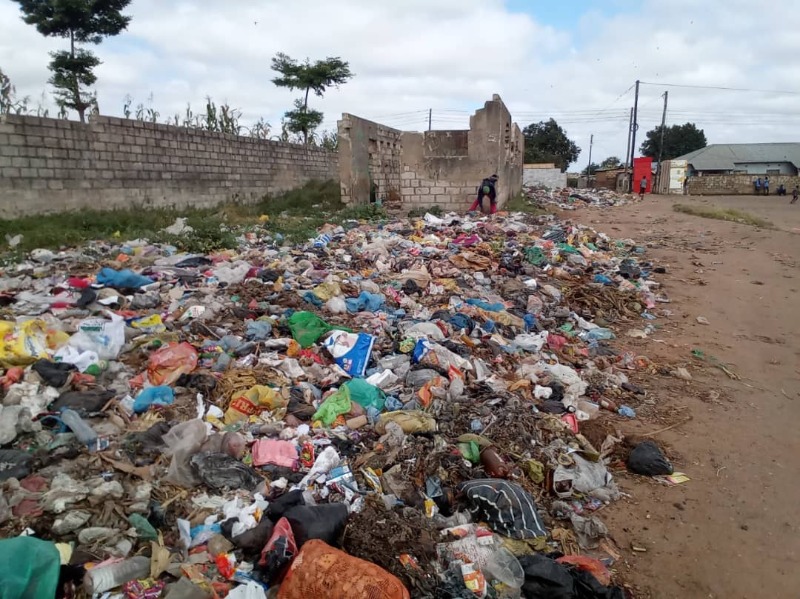 IMG-202303...0008.jpg
(Filesize: 179KB)
IMG-202303...0008.jpg
(Filesize: 179KB)
-
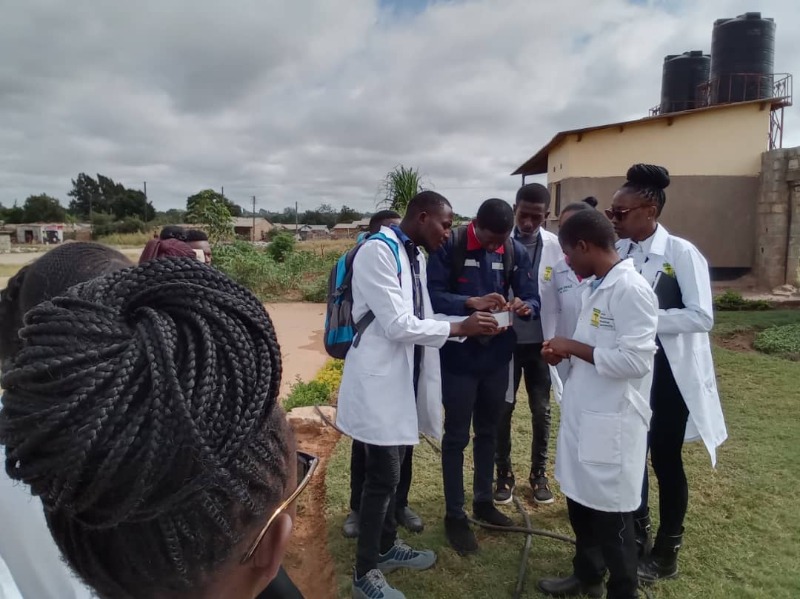 IMG-202303...0041.jpg
(Filesize: 118KB)
IMG-202303...0041.jpg
(Filesize: 118KB)
-
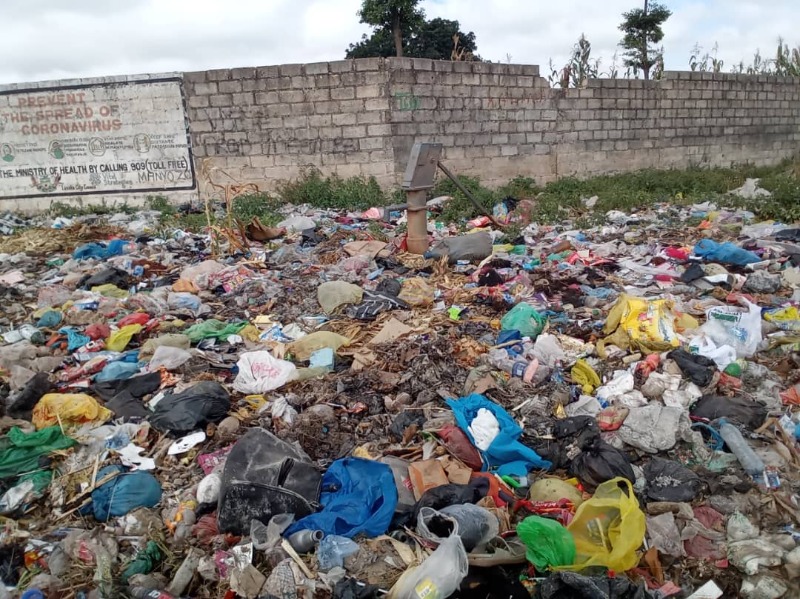 IMG-202303...0009.jpg
(Filesize: 209KB)
IMG-202303...0009.jpg
(Filesize: 209KB)
-
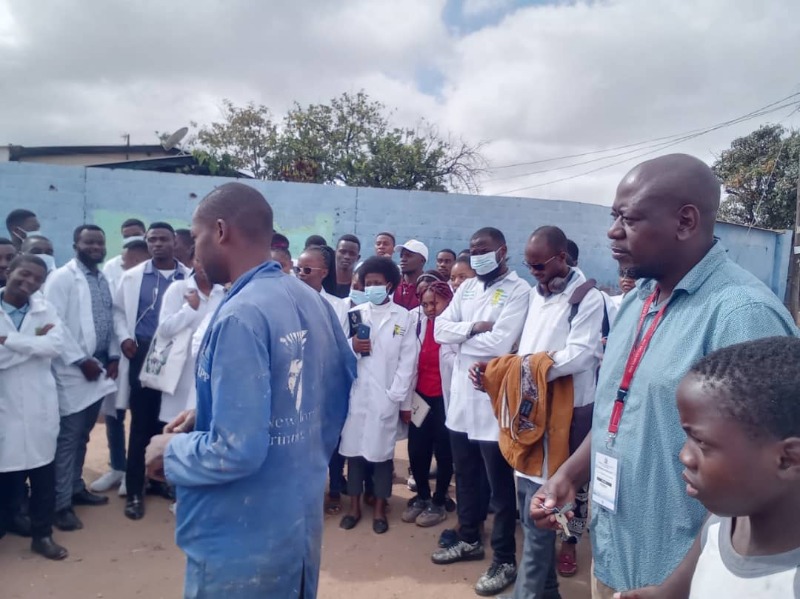 IMG-202303...0005.jpg
(Filesize: 118KB)
IMG-202303...0005.jpg
(Filesize: 118KB)
-
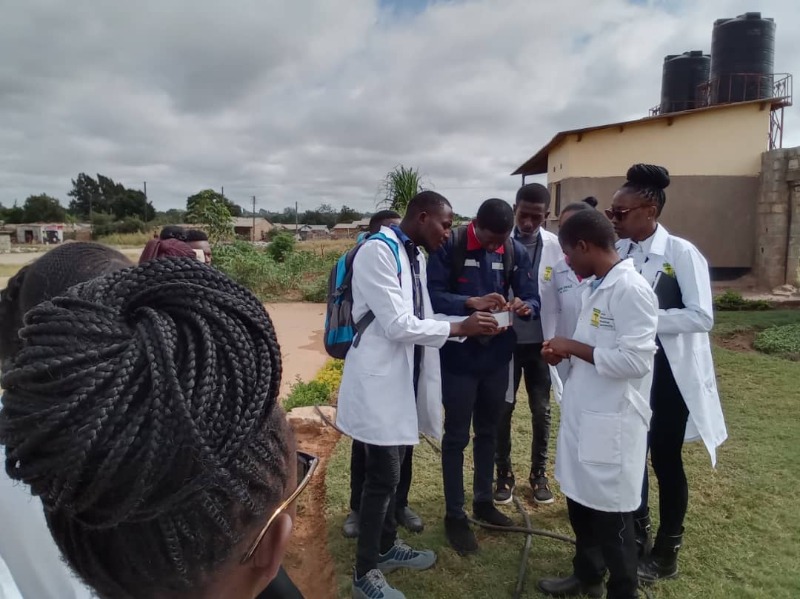 IMG-202303...0004.jpg
(Filesize: 118KB)
IMG-202303...0004.jpg
(Filesize: 118KB)
-
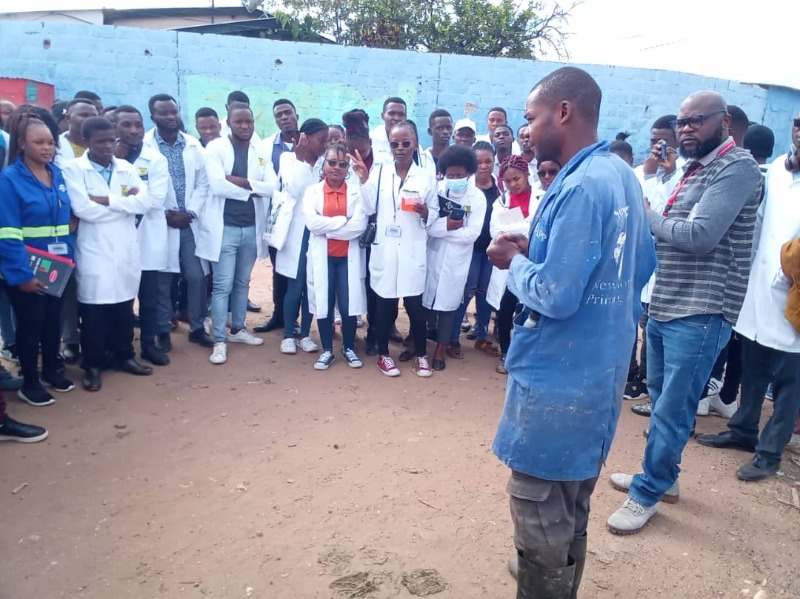 IMG-202303...0007.jpg
(Filesize: 143KB)
IMG-202303...0007.jpg
(Filesize: 143KB)
-
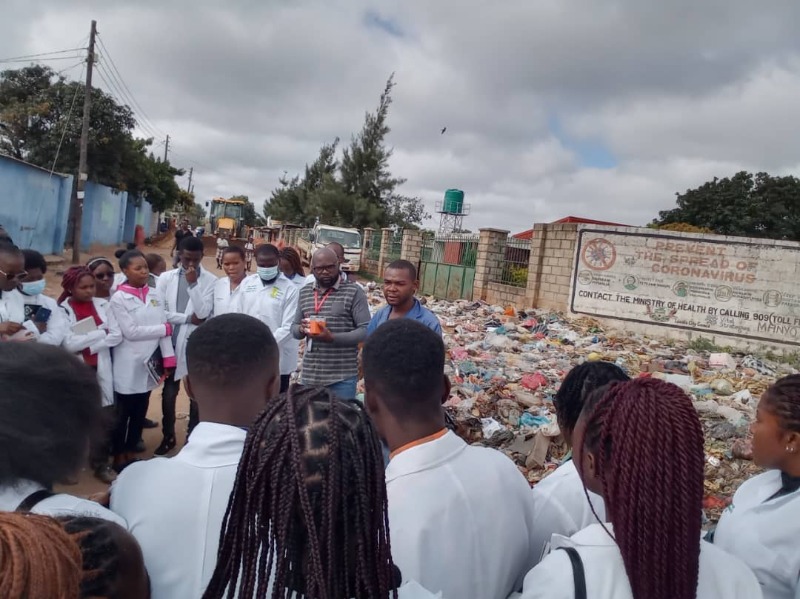 IMG-202303...0003.jpg
(Filesize: 127KB)
IMG-202303...0003.jpg
(Filesize: 127KB)
-
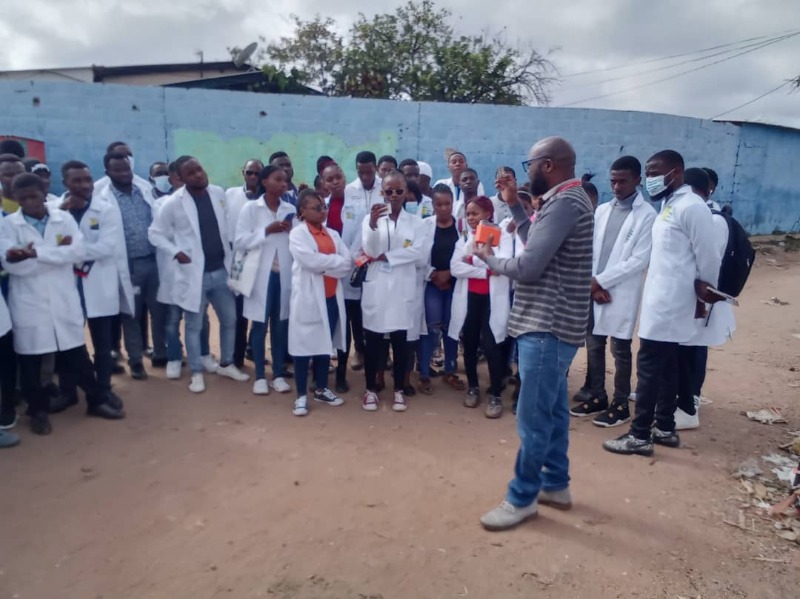 IMG-202303...0006.jpg
(Filesize: 110KB)
IMG-202303...0006.jpg
(Filesize: 110KB)
Please Log in to join the conversation.
You need to login to reply
Share this thread:
- Forum
- categories
- Sanitation systems
- Environmental issues
- The Year of Zero Waste: From Momentum to Action; Mar 27, 2024 01:30 PM India time
Recently active users. Who else has been active?
Time to create page: 0.358 seconds







